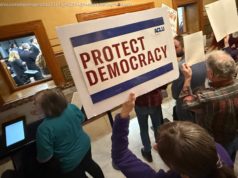Judge Brett Kavanaugh’s appearance before the Senate Judiciary Committee this week offers senators their only real opportunity to challenge the Supreme Court nominee’s legal thinking before he would take a lifetime appointment on America’s highest court.
Here’s what to watch for this week:
Robert Mueller and executive power
Special counsel Robert Mueller’s investigation into Russia’s interference in the 2016 presidential election remains at the forefront of the political arena, and this will be no exception.
The Supreme Court could ultimately resolve disputes arising from that investigation, and senators have said they will ask Kavanaugh about his views of executive power and when the president can be subject to investigation and indictment.
Kavanaugh knows a thing or two about investigating a president. He worked as a deputy to independent counsel Ken Starr, going after President Bill Clinton in the 1990s. Back then, in a memo, he explained why he felt it was necessary to get Clinton to answer questions under oath about White House intern Monica Lewinsky. In the memo, he suggested that the American people and Congress needed to know the full extent of the President’s wrongdoing.
But after serving in the Bush White House, his thinking about pursuing a president seems to have evolved. In 2009, he wrote that having seen how „complex“ and „difficult“ the job was, he thought it was „vital that the President be able to focus on his never-ending tasks with as few distractions as possible.“ He proposed that any criminal or civil claims against a president be deferred until he left office.
„(T)he indictment and trial of a sitting president,“ Kavanaugh wrote in a 2009 law review, „would cripple the federal government, rendering it unable to function with credibility in either the international or domestic arenas.“
Obamacare
For Democrats, health care is a possible way to win political points for the upcoming midterm elections at the hearings.
Democrats have said they worry that Kavanaugh would move to strike down popular provisions, such as the requirement that insurers cover everyone regardless of medical history and do not charge more for people with certain health conditions.
„I think this becomes the narrative of his nomination, which could bring it down,“ said Sen. Sherrod Brown, D-Ohio, according to the Los Angeles Times. „If people realize that their insurance is at risk because of this court nominee, I think there is going to be a lot of pressure put on a lot of people to vote no.“
Trump has long criticized the 2010 Affordable Care Act and targeted Chief Justice John Roberts for his crucial fifth vote to uphold the law in 2012. „If I win the presidency, my judicial appointments will do the right thing unlike Bush’s appointee John Roberts on Obamacare,“ Trump tweeted in 2015.
When a DC Circuit panel upheld the ACA in 2011, Kavanaugh dissented on procedural grounds, rather than assessing the merits. He said it was premature to resolve a dispute that involved an insurance mandate to be imposed in 2014, with a tax penalty the following year. Yet as he dissented, Kavanaugh laid out limits on Congress‘ power to regulate commerce. The crux of the litigation at that point was whether Congress could order people to buy a product, that is, health insurance.
Government’s authority over business
The Trump administration has vigorously worked to eliminate regulations on business, for example, in the workplace and over the environment. White House Counsel Don McGahn has said the administration has screened judicial candidates for an anti-regulatory focus.
Kavanaugh’s thinking has been in sync with the administration. He has argued that regulatory agencies should exercise authority only when it is clearly spelled out in federal statutes, departing from the judicial practice of deferring to agency interpretations of an open-ended law. In one 2014 dispute, Kavanaugh criticized a Labor Department move to sanction SeaWorld following the drowning of a trainer by the orca Tilikum, declaring that the agency had „stormed headlong into a new regulatory arena.“
More broadly, Kavanaugh has questioned an entrenched 1984 Supreme Court case, Chevron v. Natural Resources Defense Council, that says judges should defer to agency interpretations of ambiguous laws. That, Kavanaugh said in a 2017 speech, „encourages agency aggressiveness on a large scale.“
Roe v Wade
Senators will ask Kavanaugh the same question that has come up in almost every modern-day confirmation hearing: Does he think Roe v. Wade, the 1973 opinion that legalized abortion, was wrongly decided and should be overturned?
The opinion is more than 40 years old, but it is still a flashpoint and opponents of abortion believe that Kavanaugh will deliver a fifth vote to either overturn Roe or cripple it.
Sen. Susan Collins, a Maine Republican who supports abortion rights, met with Kavanaugh last month and seemed satisfied that he will respect Roe. She said he’d called it „settled law“ during their meeting.
But while lower court judges must abide by Supreme Court precedent, a Supreme Court justice has the latitude to try to reverse it. Supporters of abortion rights fear the worst, and Democratic senators will push him on the issue.
„It’s not enough for Brett Kavanaugh to say that Roe is ’settled law,‘ “ Sen. Dianne Feinstein, a California Democrat, said in a tweet after Collins‘ comments. „Chief Justice Roberts said the same thing in 2005. Then he voted in favor of a law that would have forced 75% of Texas clinics to close. Fool me once, shame on you. Fool me twice, shame on me.“
Where are the documents?
Friday evening, Senate Judiciary Chairman Chuck Grassley was informed that the White House would withhold some 100,000 documents concerning Kavanaugh’s record because administration lawyers believe the documents are covered by constitutional privilege. The disclosure infuriated Senate Minority Leader Chuck Schumer, a New York Democrat, who called it the „Friday Night Document Massacre.“
„President Trump’s decision to step in at the last moment and hide 100,000 pages of Judge Kavanaugh’s records from the American public is not only unprecedented in the history of Supreme Court nominations, it has all the makings of a cover-up,“ he said.
Grassley, an Iowa Republican, is refusing to supply records from Kavanaugh’s years as Bush’s staff secretary. On top of that, there are some documents that lawyers for Trump and the White House have labeled „committee confidential.“ Democrats say Grassley has deviated from the normal protocols concerning document delivery.
Grassley’s office responds that he’s made hundreds of thousands of documents available, and that Kavanaugh has issued more than 300 opinions that offer the best view of his jurisprudence.
Judge Kozinski, who resigned after sexual harassment allegations
Kavanaugh was a law clerk to Judge Alex Kozinski from 1991 to 1992 and has remained close to his former boss through the years. When Kavanaugh was nominated to the DC Circuit, Kozinski testified on his behalf at 2006 hearings, and Kavanaugh returned the praise and thanked him for helping his career.
Kozinski, who had sat on the California-based 9th US Circuit Court of Appeals since 1985, stepped down in December after numerous women accused him of sexual harassment. The federal judiciary dropped its investigation of Kozinski once he resigned. As part of that episode, the Senate panel already has scrutinized the judiciary’s misconduct policies, and Democrats are likely to ask what Kavanaugh knew of Kozinski’s behavior as they raise broader sexual-harassment concerns.
The White House issued a statement in July saying that Kavanaugh was never aware of allegations of sexual misconduct against his longtime mentor: „Judge Kavanaugh clerked for Alex Kozinski more than 25 years ago. Prior to the public reports late last year, Judge Kavanaugh had never heard any allegations of sexual misconduct or sexual harassment by Judge Kozinski.“
Brown v. Board
During several hearings for lower court judges, Sen. Richard Blumenthal, a Connecticut Democrat, has asked nominees whether they believe that the landmark civil rights opinion Brown v.






